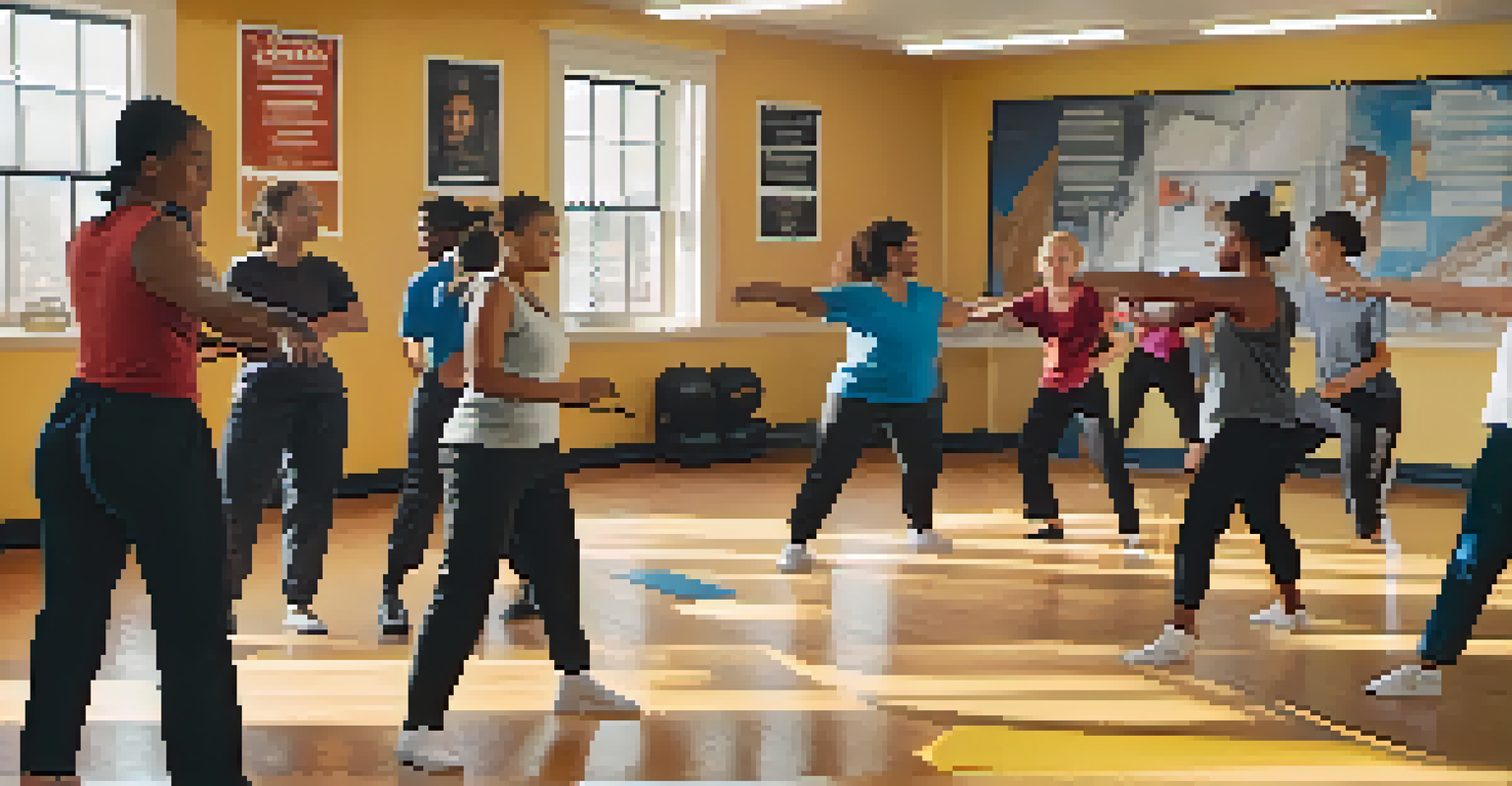Resilience and Self Defense: A Powerful Combination for Life

Understanding Resilience: The Foundation of Strength
Resilience is our ability to bounce back from adversity, much like a rubber band. When life throws challenges our way, resilient people adapt and keep moving forward. This quality is not just about enduring hardship; it’s about learning and growing from those experiences. Think of resilience as a muscle that strengthens with use; the more we face challenges, the more robust we become.
It's not whether you get knocked down, it's whether you get up.
Building resilience involves nurturing a positive mindset, developing coping strategies, and fostering strong relationships. Each setback is an opportunity for growth, and resilient individuals view obstacles as stepping stones rather than roadblocks. This perspective allows them to maintain a sense of control in chaotic situations, leading to better outcomes in life.
Incorporating resilience into your daily life can be as simple as practicing gratitude or reframing negative thoughts. By focusing on solutions instead of problems, you can train your brain to respond positively to challenges. This foundational element sets the stage for integrating self-defense into your life, creating a powerful combination for personal empowerment.
The Role of Self-Defense in Personal Empowerment
Self-defense is more than just physical training; it's about developing confidence and awareness. Knowing how to protect yourself can significantly enhance your sense of security, allowing you to navigate the world with greater ease. This confidence can transform the way you interact with others and approach new experiences, leading to personal growth.

While self-defense techniques vary, the core principle is the same: empowering individuals to take control of their safety. Whether it’s through martial arts, self-defense classes, or situational awareness training, these skills provide valuable tools for navigating potentially dangerous situations. The knowledge that you can defend yourself fosters a sense of resilience, allowing you to face challenges head-on.
Resilience as a Growth Tool
Resilience empowers individuals to learn and grow from challenges, viewing setbacks as opportunities for personal development.
Moreover, self-defense practices often teach valuable life skills, such as discipline, focus, and perseverance. These traits are essential not only in self-defense scenarios but also in everyday life. By integrating self-defense training with resilience-building practices, you create a comprehensive approach to personal empowerment.
Building a Resilient Mindset: Strategies for Success
Developing a resilient mindset starts with self-awareness and self-reflection. Take time to understand your thoughts, feelings, and reactions to stress. Journaling can be a helpful tool in this process, allowing you to track your progress and identify patterns in your behavior. Recognizing how you respond to challenges can empower you to change your perspective.
Courage is not the absence of fear, but the triumph over it.
Mindfulness practices, such as meditation or deep breathing exercises, can also enhance resilience. These techniques help you stay grounded in the present moment, reducing anxiety about the future or regrets about the past. By cultivating a mindful approach, you become more adaptable and better equipped to handle whatever life throws your way.
Additionally, surrounding yourself with supportive relationships is key to building resilience. Engage with friends, family, or community groups that uplift and encourage you. When you have a strong support system, it’s easier to bounce back from setbacks, making room for growth and resilience to thrive.
Self-Defense Techniques: Empowering Your Physical Abilities
Understanding basic self-defense techniques is a crucial aspect of personal safety. These techniques often focus on leverage, balance, and awareness rather than raw strength. For instance, learning how to escape a wrist grab or create distance from an attacker can be incredibly empowering, especially for those who may feel vulnerable.
Self-defense training can be tailored to fit individual needs, whether you're a beginner or have prior experience. Many classes incorporate practical scenarios that prepare you for real-life situations, building both your skills and your confidence. The more you practice these techniques, the more instinctive they become, reinforcing your ability to respond effectively under pressure.
Self-Defense Builds Confidence
Learning self-defense not only enhances physical safety but also fosters confidence, enabling individuals to face life's challenges more readily.
Moreover, self-defense training often emphasizes the importance of situational awareness. Being aware of your surroundings can prevent dangerous situations before they arise. By combining practical skills with awareness training, you enhance not only your physical safety but also your mental resilience.
Integrating Resilience and Self-Defense into Daily Life
The synergy between resilience and self-defense can be cultivated in your everyday life. Start by setting small, achievable goals that challenge you. Whether it’s taking a self-defense class or facing a personal fear, these goals build your confidence and resilience. Each accomplishment, no matter how small, reinforces your ability to tackle larger challenges.
Incorporating regular physical activity into your routine can also support both resilience and self-defense. Activities like yoga, martial arts, or even a simple walk can enhance your physical fitness and mental clarity. This holistic approach not only prepares your body for self-defense situations but also strengthens your mind, fostering a resilient mindset.
Lastly, don’t forget to celebrate your progress. Acknowledging your growth, whether in resilience or self-defense, reinforces positive behavior and motivates you to keep going. By weaving these practices into the fabric of your daily life, you create a powerful combination that empowers you to face life’s challenges with confidence.
Overcoming Fear: The Intersection of Resilience and Self-Defense
Fear is a natural response to perceived threats, but it can also be a barrier to personal growth. Understanding and addressing your fears is an essential step in building resilience and effective self-defense skills. By confronting your fears, you not only diminish their power but also enhance your confidence in handling difficult situations.
Self-defense training can play a significant role in overcoming fear. As you learn techniques and develop skills, you gain a sense of control over your safety. This newfound confidence can help you face other fears in life, from public speaking to pursuing new opportunities. Remember, the goal is not to eliminate fear but to manage it effectively.
Integrate Practices for Empowerment
Combining resilience and self-defense practices into daily life creates a holistic approach to personal empowerment and mental strength.
Resilience provides the mental framework to process fear and turn it into motivation. Instead of allowing fear to paralyze you, use it as a catalyst for action. Whether it’s enrolling in a self-defense class or tackling a challenging project at work, embracing fear as part of the journey can lead to incredible personal growth.
The Lifelong Journey of Resilience and Self-Defense
Embracing resilience and self-defense is a lifelong journey, not a destination. As you navigate through life, you will encounter new challenges and experiences that test your strength and adaptability. The key is to view each experience as an opportunity for growth, allowing you to continuously build on your resilience and self-defense skills.
Regularly reassessing your goals and strategies is important in this journey. Life changes, and so do our needs and circumstances. By remaining flexible and open to new learning opportunities, you can adapt your resilience and self-defense practices to fit different stages of your life.

Finally, remember that sharing your journey can inspire others. Whether through mentoring, teaching, or simply sharing your experiences, you contribute to a community of resilience and empowerment. By fostering connections with others on similar paths, you create a supportive environment where everyone can thrive.